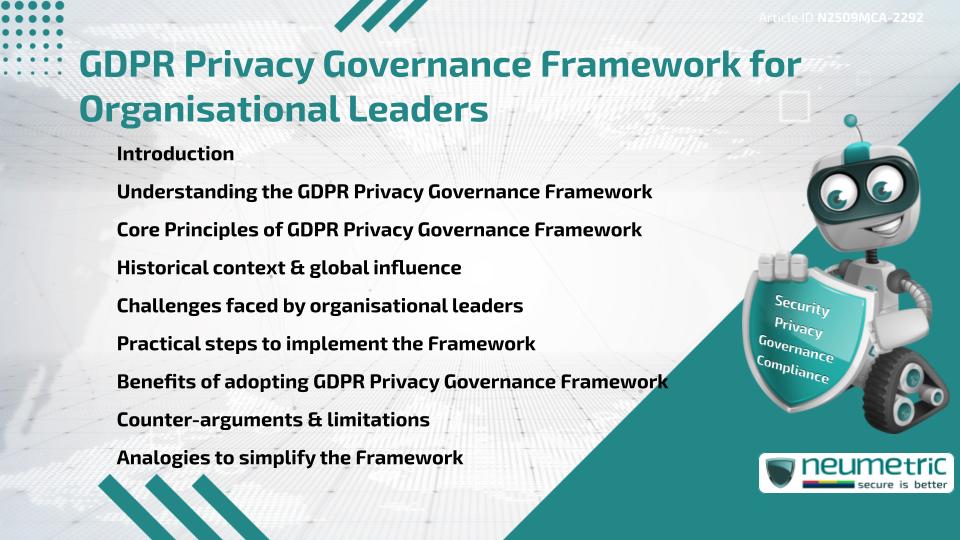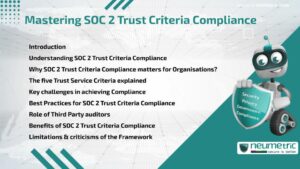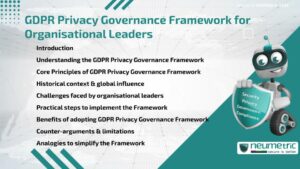Table of Contents
ToggleIntroduction
The GDPR Privacy Governance Framework is a structured approach that guides organisations in protecting Personal Data & ensuring compliance with the General Data Protection Regulation [GDPR]. It establishes clear responsibilities for organisational leaders, highlights Data Protection principles & provides actionable steps for embedding Privacy into everyday operations. This Framework not only ensures Regulatory Compliance but also builds trust with Stakeholders, reduces Risk & improves transparency. Leaders who understand & apply it effectively are better positioned to balance accountability with operational efficiency.
Understanding the GDPR Privacy Governance Framework
At its core, the GDPR Privacy Governance Framework is designed to align organisational processes with the GDPR. It requires organisations to designate clear responsibilities for Data Protection, implement documented Policies & adopt Risk-based practices. For leaders, this means more than simple compliance; it involves creating a culture where Privacy is prioritised at every stage of decision-making.
Core Principles of GDPR Privacy Governance Framework
The Framework revolves around several principles:
- Lawfulness, fairness & transparency in data processing
- Purpose limitation, ensuring data is used only for legitimate objectives
- Data minimisation to collect only what is necessary
- Accuracy & storage limitation to prevent misuse of outdated data
- Integrity & confidentiality to safeguard Personal Data against breaches
For leaders, these principles serve as benchmarks to guide Policies & actions across departments.
Historical context & global influence
The GDPR Privacy Governance Framework emerged in 2018 when the GDPR came into force, reshaping how organisations handle Personal Data in Europe & beyond. Its impact quickly spread worldwide, influencing laws like the California Consumer Privacy Act (CCPA) and the Brazilian LGPD. Organisational leaders across industries had to adapt rapidly, introducing compliance measures & reshaping Governance structures.
Challenges faced by organisational leaders
Leaders face several hurdles in applying the Framework effectively:
- Balancing compliance with business innovation
- Managing costs of compliance programs
- Addressing Employee resistance to new processes
- Coordinating across multiple jurisdictions with varying laws
These challenges underline the importance of leadership commitment & cross-departmental collaboration.
Practical steps to implement the Framework
Organisational leaders can take specific measures to embed the GDPR Privacy Governance Framework:
- Appoint a Data Protection Officer (DPO) to oversee compliance.
- Conduct regular Data Protection Impact Assessments (DPIAs) for high-Risk projects.
- Train Employees at all levels on Privacy principles.
- Adopt Privacy by design & default in all systems & processes.
- Establish Audit mechanisms to monitor ongoing compliance.
Each of these steps reinforces a proactive rather than reactive approach to Privacy Governance.
Benefits of adopting GDPR Privacy Governance Framework
Leaders who commit to the Framework experience tangible benefits:
- Enhanced trust from Customers & partners
- Reduced Risk of regulatory fines
- Improved internal accountability
- Stronger brand reputation in a competitive market
By embedding Privacy into Governance, organisations demonstrate their commitment to ethical responsibility.
Counter-arguments & limitations
Some critics argue that the GDPR Privacy Governance Framework can be overly complex or expensive for smaller organisations. Others claim it may stifle innovation by imposing strict limits on data usage. While these concerns are valid, they often highlight implementation challenges rather than flaws in the Framework itself. Effective leadership can help strike a balance between compliance & operational flexibility.
Analogies to simplify the Framework
Think of the GDPR Privacy Governance Framework as the blueprint of a well-built house. Just as a strong foundation ensures the house withstands storms, solid Governance ensures that organisations withstand regulatory scrutiny. Every window, lock & wall in the house represents Privacy measures that safeguard the people inside-mirroring how Data Protection safeguards individuals.
Takeaways
- The GDPR Privacy Governance Framework is essential for organisational leaders seeking compliance & accountability.
- It provides guiding principles for Data Protection & Risk Management.
- Leaders must overcome challenges through training, audits & cross-functional collaboration.
- Adopting the Framework enhances trust, reduces Risk & strengthens reputation.
FAQ
What is the GDPR Privacy Governance Framework?
It is a structured set of principles & responsibilities that help organisations comply with the General Data Protection Regulation & ensure Data Protection.
Why should organisational leaders care about the Framework?
Leaders play a key role in setting accountability, building trust with Stakeholders & ensuring compliance to avoid legal & reputational Risks.
How does the Framework affect small organisations?
While smaller organisations may face resource challenges, adopting simplified measures like staff training & clear data Policies can still ensure compliance.
Is the Framework only applicable in Europe?
No, its influence extends globally as many countries have introduced laws inspired by the GDPR, requiring organisations outside Europe to adapt.
What role does a Data Protection Officer play?
A DPO oversees compliance, advises on Data Protection practices & acts as a bridge between the organisation & regulators.
Can the Framework hinder innovation?
Some argue it may restrict how data is used, but with proper implementation it encourages responsible innovation by prioritising trust & transparency.
How does the Framework build Customer Trust?
By showing that an organisation values Personal Data Protection, it reassures Customers that their information is handled with integrity & care.
Need help for Security, Privacy, Governance & VAPT?
Neumetric provides organisations the necessary help to achieve their Cybersecurity, Compliance, Governance, Privacy, Certifications & Pentesting needs.
Organisations & Businesses, specifically those which provide SaaS & AI Solutions in the Fintech, BFSI & other regulated sectors, usually need a Cybersecurity Partner for meeting & maintaining the ongoing Security & Privacy needs & requirements of their Enterprise Clients & Privacy conscious Customers.
SOC 2, ISO 27001, ISO 42001, NIST, HIPAA, HECVAT, EU GDPR are some of the Frameworks that are served by Fusion – a SaaS, multimodular, multitenant, centralised, automated, Cybersecurity & Compliance Management system.
Neumetric also provides Expert Services for technical security which covers VAPT for Web Applications, APIs, iOS & Android Mobile Apps, Security Testing for AWS & other Cloud Environments & Cloud Infrastructure & other similar scopes.
Reach out to us by Email or filling out the Contact Form…





